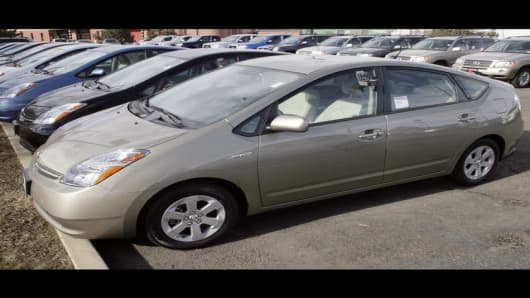Toyota Motoron Wednesday challenged a claim by a former senior executive that Japan's government funded the development of technology that drives the market-leading Prius hybrid.
The comments by Jim Press, who had been the highest-ranking non-Japanese executive at Toyota before leaving for Chrysler last year, touched off a firestorm of controversy about the development of a vehicle that has been a runaway success in the U.S. market.
Press, responsible for introducing the Prius to the U.S. market while at Toyota, was quoted as saying the Japanese government had underwritten the development of the car's critical hybrid powertrain.
"The Japanese government paid for 100 percent of the development of the battery and hybrid system that went into the Toyota Prius," Press was quoted as saying in an interview with Business Week magazine.
Toyota, which has taken steps to highlight its contribution to the U.S. economy in recent years, shot back that it had developed the Prius entirely on its own.
"It's inaccurate, and it would appear to contradict the remarks he made in the past," Xavier Dominicis, a spokesman for Toyota's U.S. operations, said of the remarks by Press.
The success of the Prius has been key in boosting Toyota's profile in a global race to bring greener cars to the market. Some analysts also credit the Prius with helping to bolster sales of Toyota's entire line-up.
Hybrids, which shift between battery power and a combustion engine to boost fuel economy, represented just 3 percent of the U.S. market in 2007, but sales were up 40 percent.
The Prius commanded 51 percent of the U.S. hybrid market in 2007. The No. 1 Japanese automaker, which last year displaced Ford Motoras No. 2 in U.S. market share, has said it is considering extending the Prius line-up -- effectively making it a brand on its own.
Press, who spent 37 years at Toyota, had been seen as a persuasive and often-understated advocate for the company in the United States. Since joining Chrysler, however, he has spoken of his pride in restoring an "American icon" now under the ownership of Cerberus Capital Management.
Chrysler issued a statement on Wednesday saying that Press had not intended to criticize Toyota.
"Press was not speaking negatively of Toyota. He said the Japanese government strongly supported ... investment in battery development, and the Prius and other Japanese models benefited from that investment," Chrysler said.
United Auto Workers President Ron Gettelfinger, reacting to the quoted remarks by Press, told a Michigan business group on Wednesday that the U.S. government should also step in to help U.S. automakers.
"The Japanese government supported the development of the Prius," Gettelfinger said. "We don't have that support here today."
In the early 1990s, the U.S. government was active in brokering a cost-sharing agreement between the Detroit-based automakers to help them develop hybrid vehicles.


